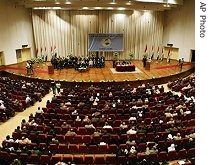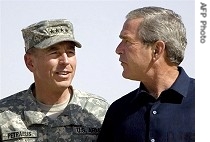2007年VOA标准英语-Sunni Arab Secular Bloc Returns to Iraqi Parlia(在线收听)
Irbil, Iraq
08 September 2007
The last political party boycotting Iraq's legislature has returned to the parliament. The move could help ease the political paralysis that has kept lawmakers from passing legislation crucial for national reconciliation in the troubled country. VOA's Jim Randle reports from northern Iraq.
 |
| Iraqi parliament (file photo) |
The Front was the last of several boycotting groups to return to parliament, although the cabinet of Prime Minister Nouri al-Maliki is still missing many of its members due to walkouts and resignations.
To advance national reconciliation, Washington has been pressuring legislators to pass major laws aimed at drawing minority Sunni Arabs more firmly into the political process.
Parliament reconvened last Tuesday and is set to consider two key laws. One eases restrictions that kept former members of Saddam Hussein's Ba'ath Party out of public office. That affects mostly Sunnis, and might ease some tensions between them and Shi'ites and Kurds, who make up most of the rest of the population.
Another piece of legislation outlines how revenue from the oil industry will be shared.
Anthony Cordesman, of the Washington-based Center for Strategic and International Studies, says the stalled debate in Parliament and the ethnic violence that has plagued the country reflect a power struggle between sectarian factions. He says Iraq's much-criticized prime minister cannot move the process forward unless the warring factions want him to.
"The compromises have to be real. It isn't passing legislation, it isn't what Prime Minister Maliki can do as prime minister," said Cordesman. "He is a minority prime minister in a political structure with no power unless the factions actually agree the compromises are adequate and see them implemented."
Cordesman says compromises will only emerge from negotiations that take place largely outside the formal political structure.
 |
| General David Petraeus, left with President Bush during surprise visit to Anbar province in Iraq, 03 Sep 2007 |
In the meantime, violence continued in several parts of Iraq, including a busy market in the holy Shi'ite town of Kufa, killing several people and wounding more. Police say two of the dead are children.
The U.S. military reported that coalition and Iraqi forces conducted ground and air attacks in Kirkuk province, in northern Iraq, to identify and root out Sunni extremists in the area. The U.S. military said at least 17 people were detained in sweeps of villages.
The military said five more suspected terrorists were seized in the cities of Kirkuk and Mosul during operations aimed at the al-Qaeda leadership and bombing networks in northern Iraq.